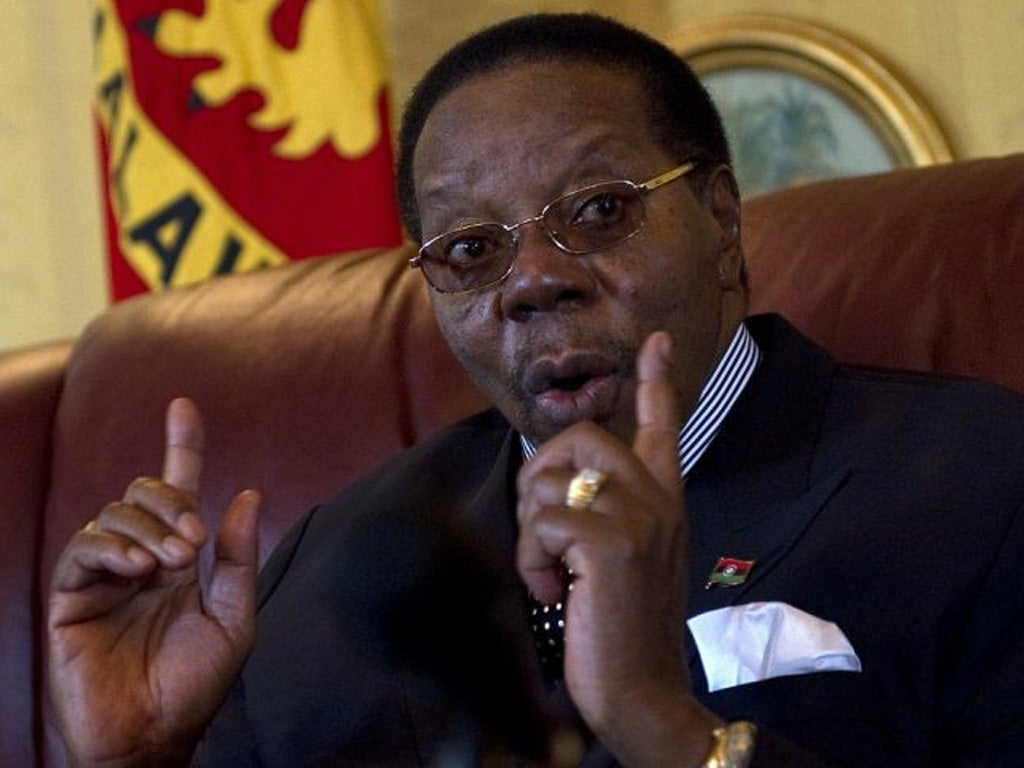Bingu wa Mutharika: President of Malawi whose reign brought economic ruin
There were signs that Mutharika’s Green Revolution would be ruinous – even before his re-election

Death has delivered Malawi of Bingu wa Mutharika, a former World Bank economist whose eight-year presidency ruined the southern African country's finances, sparked a diplomatic spat with Britain and even prompted pop star Madonna to scale back her charity work.
His death on Thursday at the age of 78, after suffering a heart attack in the capital, Lilongwe, prompted fears of an ugly succession battle between the brother he had groomed to succeed him, foreign minister Peter Mutharika, and Joyce Banda, the hugely popular vice-president who is constitutionally entitled to take over. Amid fears of civil unrest, former president Bakili Muluzi yesterday called for peace and order. "The laws are very clear that the vice president takes over," he told a press conference.
Mutharika was born of teacher parents in a Church of Scotland mission in the southern tea-growing district of Thyolo. In 1962, a year after Malawi gained independence from Britain, he entered the civil service. In 1964, after a fast-track degree in economics in India, President Hastings Banda appointed him to head the civil service.
But after a cabinet crisis in 1964, he fled Malawi in circumstances that remain unclear. He travelled to Zambia, India and the United States and in keeping with the pan-Africanist wave of the time, reverted from his birth name, Ryson Webster Thom, to his father's surname. He later claimed he had changed his name to evade spies working to silence opponents of President Banda.
He spent two decades as an international civil servant, working initially as a loans officer for the World Bank. He was director of trade and finance at the Addis Ababa-based United Nations Economic Commission for Africa. He also served as secretary-general of the Common Market for Eastern and Southern Africa (Comesa).
While in exile in 1992, he founded the United Democratic Front – an opposition movement that grew into a political party. Mutharika stood in the 1999 presidential elections but finished last among five candidates. In 2004, after failing a bid for a third term, President Muluzi backed him to take over and he won the presidential elections. A year after being elected, Mutharika left the UDF and created his own Democratic People's Party (DPP).
Initially a darling of the donor community, Mutharika's first term was marked by good rains and bumper harvests. Amid great fanfare and claiming he would teach the world's development economists a lesson, he created an agricultural input subsidy programme which increased access to seeds and fertiliser for small farmers.
After years of being reliant on food aid, Malawi in 2005 produced a grain surplus of more than 500,000 tonnes. The country repeated the feat in 2007 and increased its surplus in 2008. At the UN General Assembly, Mutharika proclaimed in 2008 that his "Green Revolution" was a recipe for "Africa to feed the world". To prove his point, he ordered Malawi to send 150 tonnes of rice to Haiti after that country's earthquake in January 2010. In the same year, he was awarded a string of honorary degrees – including from the University of Strathclyde – as well as the UN Special Millennium Development Goal Award, for "success towards eliminating hunger by enhancing food security".
But even before Mutharika's landslide re-election in 2009, observers and foreign diplomats in the country had been warning that the Green Revolution would be ruinous for the small economy, dependent on donor support for 40 per cent of its budget.
As foreign currency ran out, fuel shortages, power cuts and rising unemployment sparked growing civil unrest. In July 2011 at least 19 demonstrators were killed when police opened fire with live ammunition on a protest against the rising cost of living. Mutharika called the protesters "agents of Satan".
The demonstration came a few weeks after Malawi's darkest hour since independence, when its biggest foreign donor, Britain, ceased direct aid payments. The decision had followed a diplomatic spat prompted by a leaked cable in which British High Commissioner Fergus Cochrane-Dyet was reported to have said that Mutharika could not tolerate criticism.
Last year, Madonna also scaled back the work of her charity, Raising Malawi, which had been providing direct support for schools and orphanages for the hundreds of thousands of children in the country who have lost their parents to Aids. Madonna now channels her support to Malawi through Build On, a Connecticut charity that builds schools all over the world.
Since winning his second term, Mutharika had expended much energy on sidelining his popular number two, Mrs Banda – a women's and child's rights activist. He expelled her from the DPP last year after she denounced the shooting of demonstrators. He also handed many of her official functions to his second wife, Callista Chimombo, a former tourism minister whom he married last year, and to his brother, Peter, the foreign minister.
Malawi's short-term stability now rests with its military and police, who until now have proven loyal to the Mutharika clan. The opposition Nyasa Times said yesterday that Mutharika's inner circle had bought time after his death by claiming he was still alive when he was sent to Johannesburg on Thursday. But it now appears increasingly as though the president was already dead and the flight to Johannesburg was a time-buying exercise.
Last night, soldiers remained deployed outside Mrs Banda's residence and Peter Mutharika's whereabouts were not known.
Alex Duval Smith
Bingu wa Mutharika, politician: born Thyolo, Nyasaland (now Malawi) 24 February 1934; married twice (four children); died Lilongwe, Malawi 5 April 2012.
Subscribe to Independent Premium to bookmark this article
Want to bookmark your favourite articles and stories to read or reference later? Start your Independent Premium subscription today.

Join our commenting forum
Join thought-provoking conversations, follow other Independent readers and see their replies